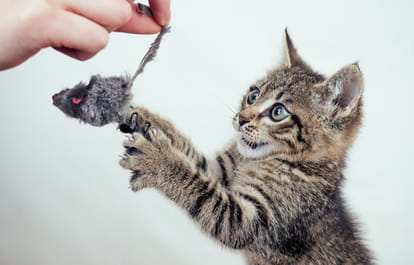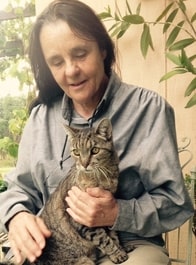
Kittens are natural night creatures, and being active in the dark is something they enjoy. But there are things you can do to keep a kitten’s nocturnal behaviors under control if it’s disturbing you.
The top reasons kittens go crazy at night include,
- They’re wired for nocturnal behaviors
- Kittens have predatory instincts
- A lack of daytime stimulation can cause nighttime restlessness
- You’re rewarding the kitten for activity at night
- Care issues and medical problems sometimes cause nighttime activity in kittens
Nighttime activity for kittens can include solitary adventures like scaling bookshelves and furniture, jumping on window sills, and dangling from curtains.
Your kitten also might enjoy getting you involved in the fun by batting your eyelids while you’re dreaming, tangling its claws in your hair, or pouncing on your feet under the covers and waking you up.
If these behaviors start driving you crazy, keep in mind that kittens are more active than grown cats. In time as a kitten matures, it usually settles down and becomes less active at night.
Here are 6 of the top reasons kittens go crazy at night and what you can do about it.
1. Kittens are Wired for Nocturnal Activity

Most species of cat, including house cats and kittens, are naturally nocturnal, making them prone to nighttime activity.
Some people say cats can see in the dark due to being nocturnal, but cats actually see best in low-light levels, such as just after dusk and just before dawn when prey animals are often active. Cats can’t see in total darkness.
The hours of early evening and early morning, just before and after light, are the times kittens are often most alert and ready for play and adventure.
How to Manage Your Kittens Nocturnal Instincts
Playing with your kitten early in the morning and in the evening just after dark can help it use its natural energy burst at these times of day. Late-night activity may go down as a result.
Petting your kitten and interacting with it for a few minutes or longer can help the animal calm down and relax, getting it ready to sleep along with you.
If your kitten is waking you up out of a sound slumber, and you want it to stop, keeping it out of your bedroom may be the only solution. Put it in a room where it can’t get into any trouble or disturb you.
Make sure it has access to a litter box, food, water, and a bed.
You can stop scratching and meowing at a closed door by putting aluminum foil, upside down tape, or another surface the kitten doesn’t like to step on outside the door as a deterrent.
Some kittens get distracted from roaming around if there is a TV or radio playing softly in a room where they have a comfy bed.
Use praise when you see the kitten being quiet and calm to train it in good behavior.
2. Kittens Have Predatory Instincts

Cats of all kinds and their kittens naturally hunt for a living in the wild. In combination with a kitten’s nocturnal nature, predatory instincts contribute to nighttime activity in kittens.
A kitten that’s jumping, leaping, lunging, and going crazy late at night is quite possibly doing it due to pent-up predatory instincts, which are switched on at night.
How to Manage Your Kitten’s Predatory Instincts
You can help your kitten work-out its predatory energy by playing games with it. Some inexpensive and easy-to-use kitten toys include:
- Laser pointers
- Food puzzles
- Long pieces of yarn or heavy string
- Long feathers
- Toy mice on a string
Even a small piece of crumpled up paper tossed to the kitten can become an instant toy.
Some kittens don’t like certain types of toys. My kitten is oblivious to laser pointers but loves chasing string. So, if one toy doesn’t work, try something else until you find a plaything your kitten enjoys.
When your kitten starts getting active in the evening, play with it for as long as possible to reduce how hyped-up it is later at night.
Giving Your Kitten a Safe Place to Play at Night
Some kittens are especially rambunctious, and playing with them in the evening might actually get them in the mood for more activities later at night.
One solution is to give the kitten a safe place to go crazy on its own without disturbing its human caregivers.
Find a room in your house where you can eliminate all potential trouble the kitten might get into, and then let it have free-reign there at night.
Remove items such as:
- Wastepaper baskets
- Electric cords
- Dishes, glassware, and other fragile items
- Jewelry and small items the kitten could ingest
- Toxic products
- Papers and clothing the kitten could damage
Also be sure to eliminate any ways the kitten could get stuck under low furniture, behind shelves, next to or under appliances, and access to an attic, basement, or outdoors.
Be sure to provide the essential kitten care items of litterbox, food, water, and a warm and cozy place to sleep. Consider leaving a few kitten toys in the space as well.
As your kitten grows up, it’s likely to outgrow the desire to play at night. By giving it some space to go wild at first, you may succeed in calming it down in the long-run.
Training Your Kitten to Hunt
Depending on where you live and how you feel about it, you may be happy to have the predatory services of a good mouser-cat when your kitten grows up.
Part of our attachment to cats throughout history is due to them keeping mice, rats, and other vermin populations down near human homes, reducing disease and damage to property.
If you want to train your kitten to hunt without being disturbed all night, you probably need to kitten-proof your home first. Get rid of any hazards to the kitten in your house and let it learn to hunt while you close the door to the bedroom and get some sleep.
Some cats do not become hunters, but many do if given a chance. If rodents are a problem where you live, you may be able to get your kitten to help you control the problem.
Just remove hazards and give the kitten nighttime access to the area where pests are a problem and see what happens.
3. Kittens, Playtime, and Nighttime Activity

The more a kitten exercises during the day, the more likely it is to sleep at night. Besides playing actively with the kitten at the beginning and end of the day, it’s also important to give it things to do during the day, especially if it’s alone while you’re at work all day.
Because they’re predators, cats like toys that move around. A few easy options are:
- Ping-pong balls
- Fake mice toys
- Catnip bags
Stationary cat exercise equipment can also give a kitten stimulation and a work-out, including:
- Scratching posts
- Scratching pads
- Cat jungle-gyms
Ways to Play More with Your Kitten
One way to keep a kitten active is giving it a companion. Kittens and puppies often get along, as well as kittens with other kittens. Either way, with a friend around, most kittens stay more active during the day, tiring them out by night.
However, sometimes two cats enjoy getting into nighttime adventures together, so be prepared for the possibility of even more disturbance from time to time.
Setting a specific time for playing with your kitten can make it easier for you to remember to do it daily, and it also trains your kitten and builds your bond with each other.
However, it’s also a good idea to stop playtime about an hour before you want to go to sleep, so the kitten isn’t feeling too hyped-up right before you turn out the lights.
4. Accidentally Training a Kitten to go Crazy at Night

You could be adding to the problem of your kitten getting active at night if you accidentally reward it for the behavior.
For example: Your kitten starts bouncing off the walls when you’re asleep. You wake up, storm into the room, say a few choice words, and then start petting or playing with it. This response on your part may reinforce the kitten’s behavior.
Feeding a kitten right after it goes nuts at night would be another way a person might accidentally reward the nighttime activity. Just chasing a kitten out of your bedroom might be a fun game from the cat’s perspective, creating an incentive to keep doing it.
In these cases, the kitten’s bad behavior is quickly followed by something it enjoys, like attention or food.
How to Not Reward a Kitten for Acting Up at Night
When you need to be stern with a kitten, either ignore it completely, say “No!” sternly, or squirt it with a spray bottle of clean water to get your message across. Reserve all forms of praise until the kitten is acting calm and relaxed.
The most important point in training a kitten is not to give in and provide a reward after an undesirable behavior. If you give in at all, it gets even harder to un-train the kitten.
However, while it’s important to not give a kitten a reward for bad behavior, it’s also vital not to punish it. Punishment only causes more bad behaviors like biting, scratching, and other fear reactions.
The only response you need, besides an occasional, stern “No!” is not giving a reward when the kitten does something you don’t want it to do, and rewarding it when it does something you like.
5. Care Issues and Kittens Going Crazy at Night
The biggest care issues that might make a kitten more active at night are:
- Litter box needs cleaning or relocating
- Food or water not available
- Warmth, comfort, or safety lacking in sleeping area
Kittens and cats often need to go to the bathroom soon after eating a big meal, and sometimes kittens get hyper if they need to relieve themselves, and the box needs cleaning or they can’t get outside.
Feeding the kitten an hour or so before your bedtime can give it plenty of time for all this to happen.
Make sure your kitten’s litter box is located in a convenient place for it to use at night but also as far as possible away from its food and water dishes.
Some kittens get hungry during the night, and having a bowl of dry food available at all times keeps them happier and less active.
Kittens always need a bowl of fresh water available at all times. Stress from unavailable food, water, or litterbox access could cause a kitten to get more active and agitated.
Kittens also need a warm, cozy, safe place to sleep. For many, that spot is right on the bed with their human.
However, if your kitten does not sleep with you, make sure it has a designated place with comfy bedding and a feeling of safety. Cozy baskets and enclosed ‘igloo’ style sleeping quarters give kittens what they need to settle down and sleep.
6. Medical Problems and Night time Active Kittens
A kitten that’s acting crazy at night could have a medical problem that’s causing the behavior. A medical cause is not as likely as the other reasons listed above, but if nothing seems to reduce the behavior, a trip to the veterinarian’s office may be in order to rule out health issues.
A medical problem in a kitten is likely to be accompanied by meowing and other obvious signs of distress or sickness along with possible nighttime activity.
One health issue that can make kittens overactive is flea allergies or an infestation of fleas. If your kitten has fleas, taking action quickly is vital to keep the infestation from spreading and taking hold in your home.
Flea allergies happen when a kitten or other pet becomes sensitive to fleas and reacts strongly to a bite. Scratching and chewing are primary symptoms.
Testing for Fleas

One way to tell if your kitten has fleas is to use a fine-toothed comb to comb through its hair. Do this over a light-colored, easily-cleanable or disposable surface such as a linoleum floor, a piece of cardboard, or a large piece of white paper.
Small bits of stuff will come out of the kitten’s hair as you comb it. Then use a spray bottle of water on a mist setting to lightly spray the bits of stuff. If you see red spots emerging, this indicates blood from flea droppings.
Animals with flea problems often bite at the base of their tail, scratch their neck and face, and repeatedly lick parts of their body.
To end a flea infestation take these steps:
- Wash all human and pet bedding in hot, soapy water.
- Vacuum carpets, rugs, and floors and then immediately dispose of the vacuum cleaner bag.
- Give all pets in the house an anti-flea bath or dusting treatment.
- Use a commercial ‘flea-bomb’ to treat your house if the infestation is severe. Read and closely follow all package directions.
When using a flea-treatment product on a kitten, be certain it is designed for kittens. Ask a veterinarian for a recommendation for a suitable product for your pet.
Feline Hyperesthesia Syndrome and Over-active Kittens
Another much less common medical problem that can cause a kitten or older cat to become suddenly hyper-active is called Feline hyperesthesia syndrome (FHS.)
No one knows for sure what causes FHS, and it is not a dangerous health condition. But it does produce strange, hyper-active behavior in some felines.
The behavior usually starts when a person touches the cat near its tail or hindquarters. This triggers the cat to start biting at its tail, grooming like crazy, scratching, or running around wildly. Sometimes the animal’s skin ripples for a few seconds.
The wild behavior usually does not last more than a few minutes, but the pet may get injured from biting or scratching itself, damage something as it runs around, or injure a person with its crazy antics.
If your kitten seems to have symptoms of FHS, talk to a veterinarian about how to handle it.
Conclusion about Kittens Going Crazy at Night
If your kitten is driving you crazy by going crazy at night,
- Play with it daily in the morning and evening.
- Give it toys and activities to work-out its predatory urges.
- Confine it to a room or area where it can do no harm by rampaging around.
- Make sure it always has a clean litterbox, food, water, and a safe and comfy bed.
By taking these steps, your kitten can be a kitten, and you can still get a good night’s sleep.

Resources:
https://www.animalhumanesociety.org/behavior/cat-keeping-you-awake-how-manage-night-activity
https://pets.webmd.com/cats/guide/nighttime-activity-cats#1
https://www.petplace.com/article/cats/pet-behavior-training/when-your-cat-gets-the-midnight-crazies/
https://www.inverse.com/article/39459-why-does-my-cat-run-around-at-night-according-to-science